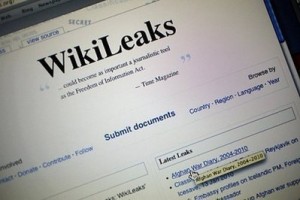 WikiLeaks publishing U.S. government secrets is taking on the oxymoronic spectacle of a 90-pound weakling kicking sand in the face of a muscle-bound bully. Yet it published another cache yesterday despite adamant U.S. protests.
WikiLeaks publishing U.S. government secrets is taking on the oxymoronic spectacle of a 90-pound weakling kicking sand in the face of a muscle-bound bully. Yet it published another cache yesterday despite adamant U.S. protests.
Instead of U.S. soldiers in Iraq and Afghanistan bemoaning their fecklessness, U.S. diplomats at more than 270 outposts around the world gossiping about local leaders provide the fodder for this media dump.
Never before in history has a superpower lost control of such vast amounts of such sensitive information.
(Der Spiegel, November 28, 2010)
But, despite dire warnings about these disclosures putting lives in danger and destabilizing American foreign relationships, I am convinced that the only consequence will be some red faces and bruised egos. No doubt this is why Secretary of State Hillary Clinton spent days in advance of Sunday’s publication phoning up foreign leaders to assure them that the nasty things said about them in dispatches by American diplomats do not reflect the “official” opinion of the U.S. government.
Moreover, just as it was with other overhyped revelations by WikiLeaks, this tranche contains very little that can be truly classified as secret. Much is being made, for example, about cables in which the King of Saudi Arabia is reportedly begging the U.S. to bomb Iran. But it’s been an open secret for years that virtually every Arab leader in the Middle East has been lobbying behind the scenes for such an attack – even as they publicly denounce any talk of this.
By the same token, it’s hardly surprising that the leaders of Pakistan and Yemen have been secretly green lighting the CIA’s use of drones to strike terrorists within their respective borders while publicly insisting that such attacks are a violation of their sovereignty.
Granted, some of these leaders will now have some splainin’ to do. And they will clearly be loath to cooperate with the U.S. if they fear they’ll be exposed in this fashion for doing so. When all is said and done, however, they will come to appreciate that it’s as much in their interest to continue their two-faced alliance as it is in the interest of the U.S
Meanwhile, it will come as a surprise only to the most naïve foreign diplomat to learn that the U.S. government has been conducting a vigorous campaign of eavesdropping on officials at the United Nations for years.
Even more ho hum are the personal slights these diplomatic cables and memos reveal. They include dispatches ridiculing Russian President Dmitry Medvedev effectively as PM Vladimir Putin’s puppet, mocking the mutual admiration society Putin has formed with fellow “alpha dog”, Italian PM Silvio Berlusconi, exposing French President Nicolas Sarkozy as an emperor with no clothes, diagnosing Afghan President Hamid Karzai as a paranoid schizophrenic, and dismissing German Chancellor Angela Merkel as an officious bore: like I said, a few red faces and bruised egos.
Frankly, a cursory search of this site will reveal commentaries on almost all of these so-called secrets. More significantly, every major power has gathered, and is hoarding, similar secrets. Therefore, perhaps it’s only a matter of time before theirs are revealed as well.
Nevertheless, I’m sure historians will have a field day sifting through these leaks for insights on stories from a bygone era when secrets were still secret – since they reportedly date back to 1966….
Such disclosures put at risk our diplomats, intelligence professionals, and people around the world who come to the United States for assistance in promoting democracy and open government.
(The White House, November 28, 2010)
Of course, the White House said essentially the same thing after WikiLeaks published its first tranche of secrets four months ago. This is why I think the only thing noteworthy about this story is the extent to which it makes a mockery of America’s much vaunted international power and influence.
 In fact, I find it incomprehensible that WikiLeaks poses this kind of clear and present danger to U.S. national security and foreign interests, and the only thing the U.S. can do is disrupt its servers for a few hours – after the secrets have been disclosed.
In fact, I find it incomprehensible that WikiLeaks poses this kind of clear and present danger to U.S. national security and foreign interests, and the only thing the U.S. can do is disrupt its servers for a few hours – after the secrets have been disclosed.
For if these leaks pose (or have caused) the kind of damage U.S. officials claim, then Julian Assange, the defiant revealer of all government secrets who heads WikiLeaks, should be either dead or sitting in Guantanamo Bay.
Instead, the U.S. seems to be relying on lowly Sweden to put an end to these leaks by having Assange arrested on an international warrant for the sexual molestation, rape, and coercion of two women in that country last August. Never mind that the women involved seem more like agents furthering a honey-trap conspiracy than victims of grievous sexual assault.
It’s no wonder international pariahs (and 90-pound weaklings, relatively speaking) like Kim Jung Il of North Korea and Mahmoud Ahmadinejad of Iran seem convinced that they can threaten, and even attack, U.S. officials and interests abroad with impunity.
NOTE: Some of you might find it even more incomprehensible (and troubling) that all of these wikileaks are being attributed to one misguided 23-year-old Army intelligence officer. But you should know that over one million government officials have access to all of these so-called secrets. Therefore, the wonder is not that he did what he did; it’s that more people have not done the same.
Clearly the U.S. government needs to restrict access to such information much further up the chain of command. And all indications are that it is doing just that….
Related commentaries:
WikiLeaks on U.S. wars…
Leave a Reply
You must be logged in to post a comment.